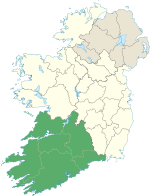Cnoc an Chuillinn
| Cnoc an Chuillinn | |
|---|---|
 Ridge and summit of Cnoc an Chuillinn East Top (near), and Cnoc an Chuillinn (far), as seen looking westwards from Maolan Bui | |
| Highest point | |
| Elevation | 958 m (3,143 ft)[1] |
| Prominence | 53 m (174 ft)[1] |
| Listing | Furth, Hewitt, Arderin, Simm, Vandeleur-Lynam |
| Coordinates | 51°59′24″N 9°42′49″W / 51.9901°N 9.7135°W |
| Geography | |
| Location | County Kerry, Ireland |
| Parent range | MacGillycuddy's Reeks |
| OSI/OSNI grid | V823833 |
| Topo map | OSI Discovery 78 |
| Geology | |
| Mountain type | Purple sandstone & siltstone Bedrock |
Cnoc an Chuillinn (Irish for "hill of the steep slope"),[2] at 958 metres (3,143 ft), is the sixth-highest peak in Ireland on the Arderin list and the seventh-highest peak in Ireland on the Vandeleur-Lynam list. The name is sometimes incorrectly anglicised to Knockacullion,[3] which is a name used for peaks and townlands in other parts of Ireland.[2] Cnoc an Chuillinn is part of the MacGillycuddy's Reeks range in County Kerry.
Geography

Cnoc an Chuillinn lies in the eastern section of the MacGillycuddy's Reeks, Ireland's highest mountain range. It is at the start of a high ridge section that, moving eastwards, includes Cnoc an Chuillinn East Top 926 metres (3,038 ft) (a subsidiary summit of Cnoc an Chuillinn, but which is itself a Vandeleur-Lynam), Maolán Buí 973 metres (3,192 ft), Cnoc na Péiste 988 metres (3,241 ft), The Big Gun 939 metres (3,081 ft) and finishes with Cruach Mhór 932 metres (3,058 ft).[4]
Between Cnoc an Chuillinn, and Cnoc an Chuillinn East Top, lies a major south-east spur to the less frequently climbed, Brassel Mountain 575 metres (1,886 ft), which descends steeply into the Black Valley below. Brassel Mountain is regarded for its steep scrambling, and as an alternative access route to the eastern section of the main Reek's ridge, from more frequently used Hag's Glen options.[5]
To the west of Cnon an Chiullinn is Cnoc na Toinne 845 metres (2,772 ft), and then the drop down to the col from which the Devil's Ladder can be descended into the Hag's Glen.[5]
Cnoc an Chuillinn's name is often misspelt, including swapping the middle-"an" for "na", or using one "l" or one "n", or using the anglicised term of Knockacullion,[3] as done in other parts of Ireland.[2]
Cnoc an Chuillinn is the 316th-highest mountain in Britain and Ireland on the Simm classification.[6] It is listed by the Scottish Mountaineering Club ("SMC") as one of 34 Furths, which is a mountain above 3,000 ft (914 m) in elevation, and meets the other SMC criteria for a Munro (e.g. "sufficient separation"), but which is outside of (or furth) Scotland;[7] which is why Cnoc an Chuillinn is sometimes referred to as one of the 13 Irish Munros.[8]
Cnoc an Chuillinn's prominence qualifies it to meet the Arderin classification, and the British Isles Simm and Hewitt classifications.[6] Cnoc an Chuillinn does not appear in the MountainViews Online Database, 100 Highest Irish Mountains, as the prominence threshold is over 100 m (328 ft).[9]
References
- ^ a b Cnoc an Chuillinn at mountainviews.ie. Accessed on 6 Feb 2013.
- ^ a b c Paul Tempan (February 2012). "Irish Hill and Mountain Names" (PDF). MountainViews.ie.
- ^ a b "Knockacullion [Cnoc an Chuilinn]". HillBaggingUK Database of British and Irish Hills. 2018.
- ^ Dillon, Paddy (1998). Exploring the South of Ireland. Ward Lock. ISBN 0-7063-7566-1.
- ^ a b Ryan, Jim (2006). Carrauntoohil and MacGillycuddy's Reeks: A Walking Guide to Ireland's Highest Mountains. Collins Press. ISBN 978-1905172337.
- ^ a b Chris Cocker; Graham Jackson (2018). "The Database of British and Irish Hills". Database of British and Irish Hills.
- ^ Mountains – Key Facts. The Munros, Corbetts, Grahams, Donalds & Furths Archived 2012-12-04 at the Wayback Machine at www.smc.org.uk. Accessed on 5 Feb 2013.
- ^ "Hill Lists: Furths". Scottish Mountaineering Club.
The list of peaks of 3000ft or more within the United Kingdom and the Republic of Ireland outside (furth) of Scotland. There are currently 34 Furths.
- ^ Mountainviews, (September 2013), "A Guide to Ireland's Mountain Summits: The Vandeleur-Lynams & the Arderins", Collins Books, Cork, ISBN 978-1-84889-164-7
See also
- Lists of mountains in Ireland
- List of mountains of the British Isles by height
- List of Furth mountains in the British Isles
External links
- MountainViews: The Irish Mountain Website
- MountainViews: Irish Online Mountain Database
- The Database of British and Irish Hills , the largest database of British Isles mountains ("DoBIH")
- Hill Bagging UK & Ireland, the searchable interface for the DoBIH
- Ordnance Survey Ireland ("OSI") Online Map Viewer
- Logainm: Placenames Database of Ireland



